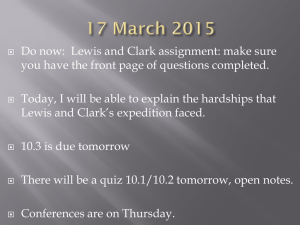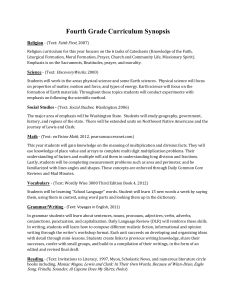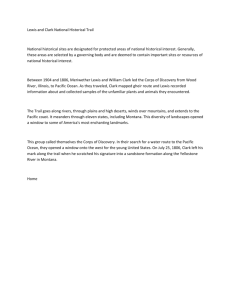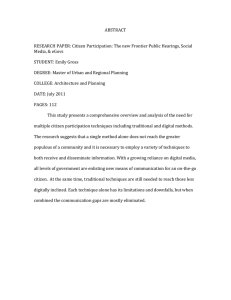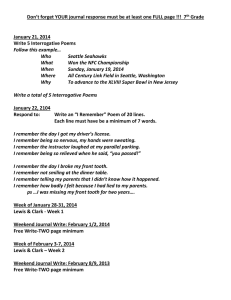American Citizen
advertisement
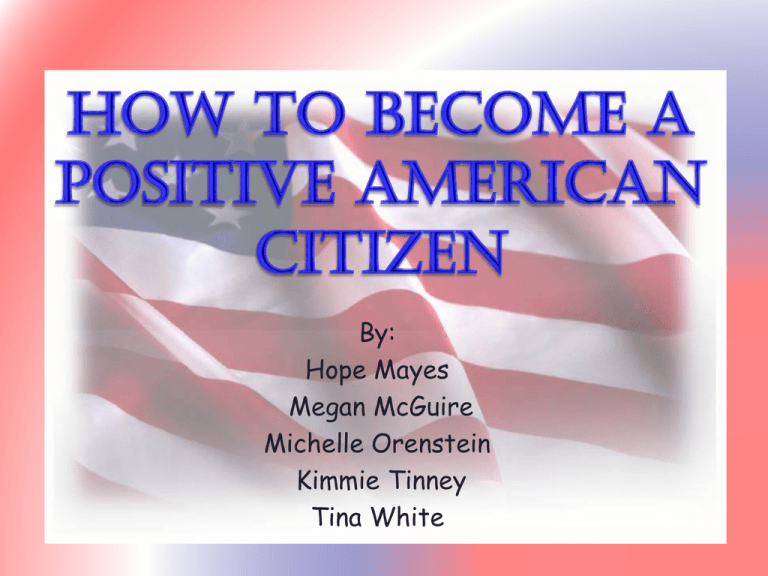
By: Hope Mayes Megan McGuire Michelle Orenstein Kimmie Tinney Tina White Task • On this web quest, the students will take on five different roles that will lead them to a better understanding of how to become a positive American citizen. • Each role will have a separate task to accomplish. Roles • Student of the Future: The student has been chosen to attend the school on the moon. They will explore the differences between needs and wants. • The Historian: The student will get advice from Thomas Jefferson on how to be a positive American. • The Explorer: This student will journey with Lewis and Clark and learn about how they became American heroes. • The President: The student will act as the newly elected President of the United States and learn the important characteristics of being a good American citizen. • The Volunteer: The students will assume the role of the future volunteer and learn its relevance to becoming a positive American citizen. Choose Your Role! The Explorer The Volunteer Student of the Future The President The Historian Georgia Performance Standards First grade • • • • • • • Science- Habits Of Mind S1CS1. Students will be aware of the importance of curiosity, honesty, openness, and skepticism in science and will exhibit these traits in their own efforts to understand how the world works. S1CS5. Students will communicate scientific ideas and activities clearly. S1E1. Students will observe, measure and communicate weather data to see patterns in weather and climate. English: Reading-Concepts of Print ELA1R1. The student demonstrates knowledge of concepts of print. English: Comprehension ELA1R5: The student acquires and uses grade level words to communicate effectively. ELA1W1: The student begins to understand the principles of ELA1W2. The student produces a response to literature. Georgia Performance Standards Continued… • • • • • • • • • • Mathematics M1N3. Students will add and subtract numbers less than 100 as well as understand and use the inverse relationship between addition and subtraction. M1N1. Students will estimate, model, compare, order, and represent whole numbers up to 100. M1N3. Students will add and subtract numbers less than 100 as well as understand and use the inverse relationship between addition and subtraction. M1D1. Students will create simple tables and graphs and interpret them. a. Interpret tally marks, picture graphs and bar graphs. b. Organize and record data using objects, pictures, tally marks, and picture graphs. M1P1. Students will solve problems (using appropriate technology). M1P2. Students will reason and evaluate mathematical arguments. M1P3. Students will communicate mathematically. Georgia Performance Standards Continued… • • • • • Social Studies SS1H1. The student will read about and describe the life of historical figures in American history. A. Contributions made by these figures: Thomas Jefferson, Lewis and Clark and Sacagawea) B. Describe how everyday life of this historical figures is similar to and different from everyday life in the present. SS1CG1. The student will describe the historical figures in SS1H1A display positive character traits of fairness, respect for others, respect environment, conservation, courage, equality, tolerance, perseverance, and commitment Evaluation • Now that you have become an expert on how to be a positive American citizen, share your knowledge with your group members. • As a group create a public service announcement about how to be an active American with a positive influence. • Get ready to share this announcement with your kindergarten buddies! • Show them that YOU are a positive American citizen. CATEGORY 4 3 2 1 Vocabulary Uses vocabulary appropriate for the audience. Extends audience vocabulary by defining words that might be new to most of the audience. Uses all six new vocabulary words. Uses vocabulary appropriate for the audience. Includes 1-2 words that might be new to most of the audience, but does not define them. Uses only four to five new vocabulary words. Uses vocabulary appropriate for the audience. Does not include any vocabulary that might be new to the audience. Uses one or more new vocabulary words. Uses several (5 or more) words or phrases that are not understood by the audience. Does not use any new vocabulary words. Enthusiasm Facial expressions and body language generate a strong interest and enthusiasm about the topic in others. Facial expressions and body language sometimes generate a strong interest and enthusiasm about the topic in others. Facial expressions and body language are used to try to generate enthusiasm, but seem somewhat faked. Very little use of facial expressions or body language. Did not generate much interest in topic being presented. Content Shows a full understanding of the topic. Shows a good understanding of the topic. Shows a good Does not seem to understanding of parts of understand the topic very the topic. well. Comprehension Student is able to accurately answer almost all questions posed by classmates about the topic. Student is able to accurately answer most questions posed by classmates about the topic. Student is able to accurately answer a few questions posed by classmates about the topic. Student is unable to accurately answer questions posed by classmates about the topic. Colorful Poster is full of color and design. Shows a serious effort to persuade the other grade. Poster has some color and some design. There is some effort to persuade the other class. Poster has little to no color or design. Not very much effort to persuade the other class. Poster has no color or design and shows no effort to persuade the other class. Conclusion Congratulations! Now you have a better understanding of how to become a positive American citizen. • You have been: • The Explorer! • The President! • The Volunteer! • The Historian! • The Student of the Future! Now you know that there are many different things that you can do to be a positive American citizen! References •Willows, Vicky. (2006). American Heroes: Lewis and Clark with Sacagawea. Houghton Mifflin Company. •Ransom, Candice. (2003). Lewis and Clark. Barnes & Noble, Inc. Minneapolis, MN. Schanzer, Rosalyn. (1997). How we crossed the west: The adventures of Lewis and Clark. National Geographic Society. Washington, D.C. Johnson, Jack. (2006) Upside Down. Jack Johnson and Friends: a sing-A-long and lullabies for the film Curious George. CD. Lewis and Clark map. Google images. Spider man. Picture. Google images. Wonder Woman. Picture. Google images. References Continued… • http://player.discoveryeducation.com/index.cfm?guidAssetId=A363BD182B71-4C72-8409-02CD60A2C7EC&blnFromSearch=1 • http://wiki.moniticello.org/mediawiki/index.php/Clothes_Rack • http://www.youtube.com/watch?v=--VMlvbkJbw&feature=email • http://wiki.monticello.org/mediawiki/index.php/Jefferson_Nickel • If You Sailed on the Mayflower in 1620, by Ann McGovern • Needs and Wants video from United Streaming Wants and Needs. 100% Educational Videos. 2005. • Brainy Betty PowerPoint Sound Created by: Hope Mayes Megan McGuire Michelle Orenstein
